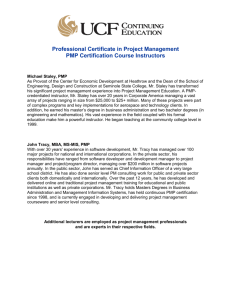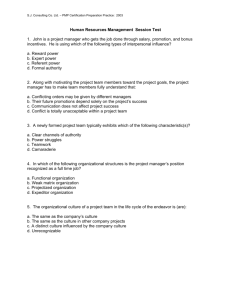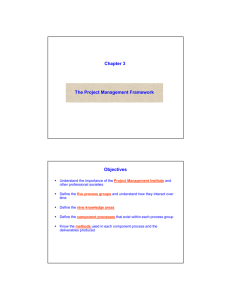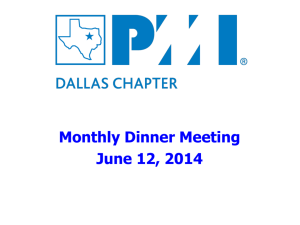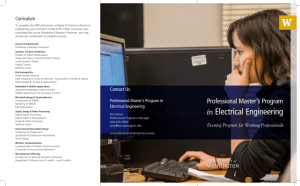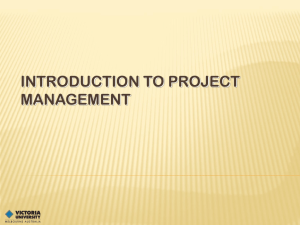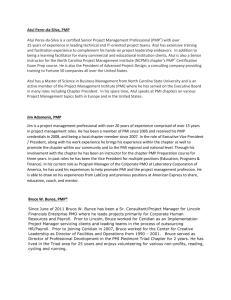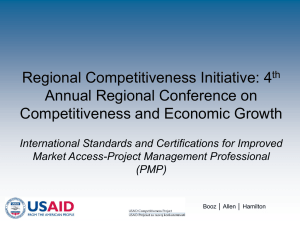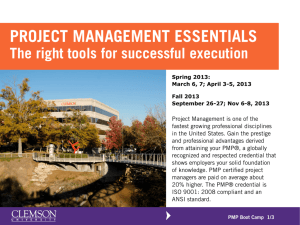Certification – worth the hassle?
advertisement
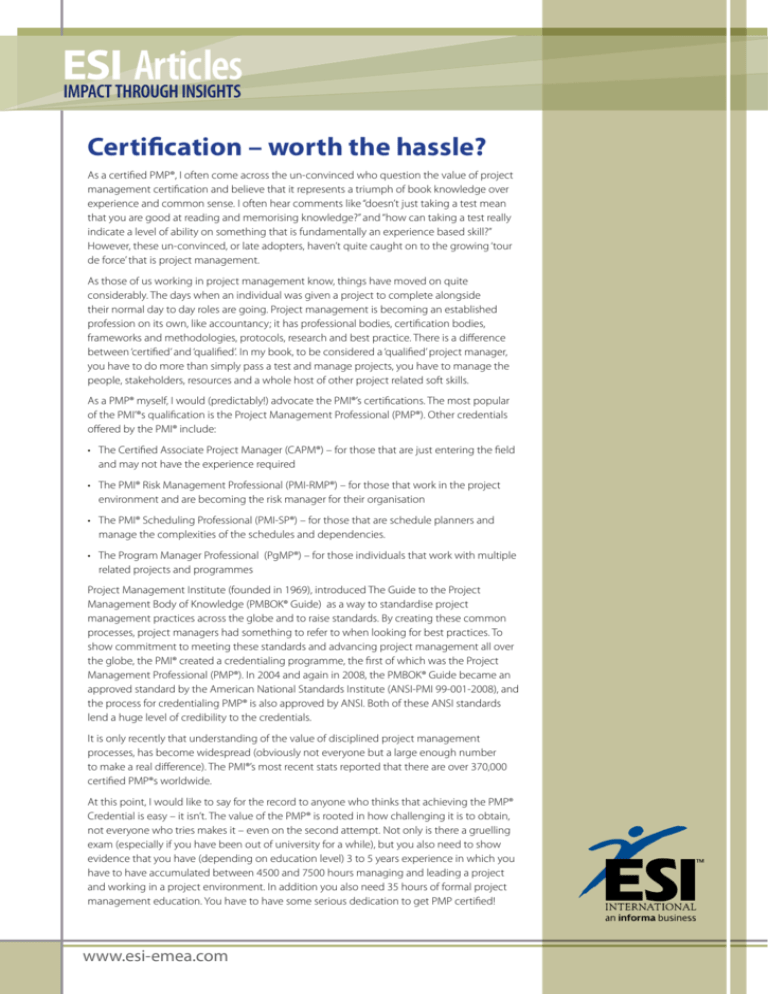
ESI Articles IMPACT THROUGH INSIGHTS Certification – worth the hassle? As a certified PMP®, I often come across the un-convinced who question the value of project management certification and believe that it represents a triumph of book knowledge over experience and common sense. I often hear comments like “doesn’t just taking a test mean that you are good at reading and memorising knowledge?” and “how can taking a test really indicate a level of ability on something that is fundamentally an experience based skill?” However, these un-convinced, or late adopters, haven’t quite caught on to the growing ‘tour de force’ that is project management. As those of us working in project management know, things have moved on quite considerably. The days when an individual was given a project to complete alongside their normal day to day roles are going. Project management is becoming an established profession on its own, like accountancy; it has professional bodies, certification bodies, frameworks and methodologies, protocols, research and best practice. There is a difference between ‘certified’ and ‘qualified’. In my book, to be considered a ‘qualified’ project manager, you have to do more than simply pass a test and manage projects, you have to manage the people, stakeholders, resources and a whole host of other project related soft skills. As a PMP® myself, I would (predictably!) advocate the PMI®’s certifications. The most popular of the PMI’®s qualification is the Project Management Professional (PMP®). Other credentials offered by the PMI® include: • The Certified Associate Project Manager (CAPM®) – for those that are just entering the field and may not have the experience required • The PMI® Risk Management Professional (PMI-RMP®) – for those that work in the project environment and are becoming the risk manager for their organisation • The PMI® Scheduling Professional (PMI-SP®) – for those that are schedule planners and manage the complexities of the schedules and dependencies. • The Program Manager Professional (PgMP®) – for those individuals that work with multiple related projects and programmes Project Management Institute (founded in 1969), introduced The Guide to the Project Management Body of Knowledge (PMBOK® Guide) as a way to standardise project management practices across the globe and to raise standards. By creating these common processes, project managers had something to refer to when looking for best practices. To show commitment to meeting these standards and advancing project management all over the globe, the PMI® created a credentialing programme, the first of which was the Project Management Professional (PMP®). In 2004 and again in 2008, the PMBOK® Guide became an approved standard by the American National Standards Institute (ANSI-PMI 99-001-2008), and the process for credentialing PMP® is also approved by ANSI. Both of these ANSI standards lend a huge level of credibility to the credentials. It is only recently that understanding of the value of disciplined project management processes, has become widespread (obviously not everyone but a large enough number to make a real difference). The PMI®’s most recent stats reported that there are over 370,000 certified PMP®s worldwide. At this point, I would like to say for the record to anyone who thinks that achieving the PMP® Credential is easy – it isn’t. The value of the PMP® is rooted in how challenging it is to obtain, not everyone who tries makes it – even on the second attempt. Not only is there a gruelling exam (especially if you have been out of university for a while), but you also need to show evidence that you have (depending on education level) 3 to 5 years experience in which you have to have accumulated between 4500 and 7500 hours managing and leading a project and working in a project environment. In addition you also need 35 hours of formal project management education. You have to have some serious dedication to get PMP certified! www.esi-emea.com So, why would I recommend adding the PMP® credential to your name? 1. Put yourself ahead of the pack Project management as a core skill is growing within organisations, leading some organisations to elevate it from a specialised niche skill to an identified core skill. This means that you need something to set you apart from the other project managers going for the same job/contract/ promotion as you. I have seen it many times in the past, where organisations filter out people who don’t have the PMP®...before they even get to interview stage. If you are a consultant or a freelancer, often the organisations where you will go to work, are made up of teams led by certified PMP®s and will expect at least this standard for new people coming in. I have also seen the trend in tenders released by government agencies or private organisations where they require that the leading project manager be certified! 2. Position yourself for a better salary (possibly) Ok – so that’s a bit of a crude way of putting it, the more sensitive among you might refer to it as ‘higher billing potential!’ But seriously, if the recent survey done by PMI® showing stats that are to be believed, certified PMP®s , earn 20% more than the non certified Project Managers, on average. I definitely believe that being PMP certified has definitely made me more marketable. 3. Broaden your experience with global networking I have mentioned that there are around 370,000 certified PMP®s around the globe. This is a massive benefit in itself. This means that all PMP®s are able to talk to each other in a common language and work to an international standard. For employers, it is invaluable for them to be able to recruit people from anywhere on the globe, if they have the PMP® credential, they will all speak the same vocabulary! PMI® also offers a fantastic opportunity for networking through their conferences, chapters, and special interest groups. 4. Distinguish yourself through recognition and credibility 5. Be proud of your personal achievement As mentioned above, getting a PMP® certification isn’t easy. Setting yourself the goal of becoming a PMP®, completing the application review and study necessary to sit the exam, and finally passing the exam is a tremendous achievement. Be proud of your achievement, and you will find yourself in good company, all of whom found the journey as challenging and exciting as you did. The last step of your certification is agreeing to the PMI® Code of Conduct, which gently reminds us that as PMP®s we are part of a growing community – one being watched closely from the sceptics. So that’s where I stand on PMP® certification. However, that is not the whole story...I’m not an idealist, and I don’t believe that everyone that becomes PMP® certified, will instantly morph into a fantastic project manager. Like all credentials, just getting the certificate shows that you have at least the minimum acceptable level. To be that great project manager, you need a whole host of ‘soft skills’ too. You must have good communication skills, leadership skills and interpersonal skills as a start. And, of course, there really is no substitute for experience. It isn’t just the certificate that makes you a great project manager, but what you do with it that counts. Getting the credential represents a commitment to learning and gives you a solid foundation from which you can continue building your road-tested skills and experiences. Biography Joseph R. Czarnecki, PMP, Senior Consultant for Global Learning Solutions, ESI International, works with ESI’s European and global clients to leverage ESI’s expertise and resources to maximise client investments in improving the performance of project management and business analyst professionals and operations. Joe has been with ESI for over 12 years and during that time has played a key role in the development and refinement of a majority of ESI’s courses as well as developed several highly tailored project management course suites for ESI’s global clients. Prior to joining ESI he worked with KPMG. Taking the time and making the effort to get certified says something about you. As an employer, I am always impressed by someone had been proactive and fulfilled this commitment to their career, in addition to telling me that they have achieved a set level of knowledge and skill in project management, it gives them just a bit more credibility and says that they will stick it out when the going gets tough. On the flip side, The PMP® certification is especially useful way for employers to show that they value their employees, as it requires that you invest in continuous professional development. This ensures that your knowledge stays fresh and that project managers remain current and relevant. Find out how ESI International can help your organisation. To learn more, please contact ESI at enquiries@esi-intl.com or +44(0)20 7017 7100. www.esi-emea.com
